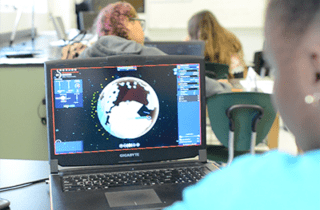Presented by Nick Night, Game Producer, Venture Valley; and Carrie Willis, STEAM and Technology Director, Valley Preparatory School (CA)
Presented by Julia Rivard Dexter, CEO, Shoelace Learning; and Lauren Lutz-Coleman, Director of Education, Shoelace Learning
Presented by Lindsey Tropf, M.Ed., Founder and CEO, Immersed Games
The situation was bleak: There were just a few plants. The mule deer were hungry. There were no pollinators. Other animals were reproducing. The ecosystem was on the verge of collapse. Those in charge would need to figure out what went wrong. And then make quick decisions to save it. Good thing this was a simulated game designed to engage students in complex science concepts. They probably won’t feed mule deer in the future, but through a thoughtfully constructed interactive video game, learners can build their science proficiency in engaging and meaningful ways.
In this edWebinar, we will dive into how games can be used to support the innovations of the NGSS, such as progressions of the three dimensions across K-12, being phenomena-driven, and teaching with storylines.
Developed in partnership with Schell Games, DigitalMill, and the play2PREVENT Lab at Yale School of Medicine (play2prevent.org), PlayForward: Elm City Stories is an interactive, role-playing videogame designed to provide at-risk young teens the opportunity to acquire and practice skills to reduce sexual risk behaviors, with the ultimate goal of preventing HIV.
Presenter, Ryan Schaaf, Assistant Professor of Technology at Notre Dame of Maryland University, discussed integrating a wide range of digital games, including those utilizing the Common Core, into the curriculum. He also explored the instructional strategies essential to making a digital game-based learning experience a success for students. Meaningful assessment processes such as product and process rubrics, as well as self and/or peer evaluation practices for digital game-based learning experiences, were determined.
Educators today are rethinking and reshaping their practice to align with the demands of a rapidly changing wired world. Consequently, a greater emphasis has been placed on skills such as creativity, collaboration, critical thinking, design, play, story, and student agency, all of which can be leveraged by video games. In this edWeb.net webinar presented by the Gaming-Based Learning community, Canadian educator Paul Darvasi shared many practical classroom examples to discuss how video games, as an essential manifestation of contemporary culture, are naturally conducive to learning in the 21st century.
In this webinar for the Game-Based Learning community, third grade teacher Jim Pike demonstrated Mathcraft, a Common Core Math curriculum centered around the popular video game Minecraft that he developed and has been using with his students over the past year.









